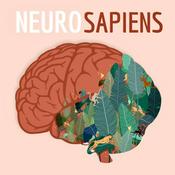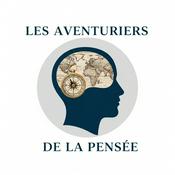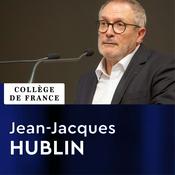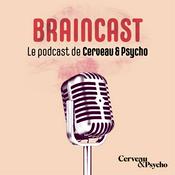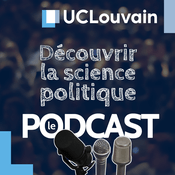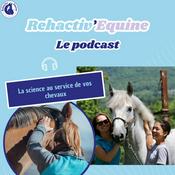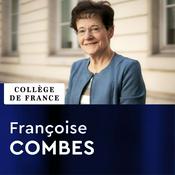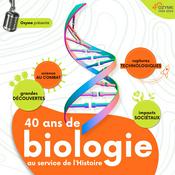Sean Carroll's Mindscape: Science, Society, Philosophy, Culture, Arts, and Ideas
Sean Carroll

Dernier épisode
412 épisodes
- Welcome to the February 2026 Ask Me Anything episode of Mindscape! These monthly excursions are funded by Patreon supporters (who are also the ones asking the questions). We take questions asked by Patreons, whittle them down to a more manageable number -- based primarily on whether I have anything interesting to say about them, not whether the questions themselves are good -- and sometimes group them together if they are about a similar topic. Enjoy!
Blog post with AMA questions and transcript: https://www.preposterousuniverse.com/podcast/2026/02/02/ama-february-2026/
Note that Mindscape now has a new hosting provider, Libsyn. (Actually a return home, as that was my first host when Mindscape was launched.) Things seem to be going smoothly, but let us know if there are any technical glitches.
Support Mindscape on Patreon. - Evolution with natural selection involves an intricate mix of the random and the driven. Mutations are essentially random, while selection pressures work to prefer certain outcomes over others. There is tremendous divergence of species over time, but also repeated convergence to forms and mechanisms that are unmistakably useful. We see this clearly in eyes and fins, but the basic pattern also holds for brains and forms of social organization. I talk with philosopher Rachell Powell about what these ideas mean for humans, other terrestrial species, and also for forms of life we have not yet encountered.
Blog post with transcript: https://www.preposterousuniverse.com/podcast/2026/01/26/342-rachell-powell-on-evolutionary-convergence-morality-and-mind/
Support Mindscape on Patreon.
Rachell Powell received her Ph.D. in philosophy from Duke University. She is currently a Professor of Philosophy at Boston University. She has held fellowships at the National Humanities Center, the American Council of Learned Societies, the Konrad Lorenz Institute for Evolution and Cognition Research, the National Evolutionary Synthesis Center, the Berlin School of Mind and Brain at Humboldt University, and the Center for Genetic Engineering and Society at North Carolina State University.
Boston University web page
PhilPapers publications - "Things fall apart; the centre cannot hold," wrote W.B. Yeats. I don't know about the centre, but the tendency of things to fall apart is pretty universal, ultimately due to the Second Law of Thermodynamics. Anyone living in a society or involved with technology must therefore be interested in the concept of maintenance -- keeping systems working. In his book Maintenance: Of Everything, Part One, Stewart Brand looks at the challenges and rewards of this concept.
Blog post with transcript: https://www.preposterousuniverse.com/podcast/2026/01/19/341-stewart-brand-on-maintenance-as-an-organizing-principle/
Support Mindscape on Patreon.
Stewart Brand received an undergraduate degree in biology from Stanford University. He was the founder, editor, and publisher of the Whole Earth Catalog, which won a National Book Award. He founded the journal CoEvolution Quarterly and the WELL electronic community, and was a co-founder of the Long Now Foundation. He has been called "the 20th century's top influencer."
Web site
Amazon author page
Wikipedia - At any given moment, an uncountable number of events are happening, but only some of them matter to us. What does it mean for something to matter, and more importantly, what does it mean for us to matter -- to ourselves as well as to others? The need to matter can be motivation to do great things, but it can also be a reason for people to come into conflict. Philosopher/novelist Rebecca Newberger Goldstein explores this issue in her new book The Mattering Instinct: How Our Deepest Longing Drives Us and Divides Us.
Blog post with transcript: https://www.preposterousuniverse.com/podcast/2026/01/12/340-rebecca-newberger-goldstein-on-what-matters-and-why-it-matters/
Support Mindscape on Patreon.
Rebecca Newberger Goldstein received her Ph.D. in philosophy from Princeton University. She is the author of several novels and works of non-fiction. Among her awards are the MacArthur and Guggenheim Fellowships, membership in the American Academy of Arts and Sciences, and the National Humanities Medal.
Web site
Amazon author page
Wikipedia - It's become increasingly clear that the Turing Test -- determining whether human interlocutors can tell whether a conversation is being carried out by a human or a machine -- is not a good way to think about consciousness. Modern LLMs can mimic human conversation with extraordinary verisimilitude, but most people would not judge them to be conscious. What would it take? Is it even possible for a computer program to achieve consciousness, or must consciousness be fundamentally "meat-based"? Philosopher Ned Block has long argued that consciousness involves something more than simply the "functional" aspects of inputs and outputs.
Blog post with transcript: https://www.preposterousuniverse.com/podcast/2026/01/05/339-ned-block-on-whether-consciousness-requires-biology/
Support Mindscape on Patreon.
Ned Block received his Ph.D. in philosophy from Harvard University. He is currently Silver Professor in the Department of Philosophy at New York University, with secondary appointments in Psychology and Neural Science. He is also co-director of the Center for Mind, Brain, and Consciousness. He is Past President of the Society for Philosophy and Psychology and was elected a Fellow of the American Academy of Arts & Sciences.
Web site
NYU web page
PhilPeople profile
Google Scholar publications
Wikipedia
Plus de podcasts Sciences
Podcasts tendance de Sciences
À propos de Sean Carroll's Mindscape: Science, Society, Philosophy, Culture, Arts, and Ideas
Ever wanted to know how music affects your brain, what quantum mechanics really is, or how black holes work? Do you wonder why you get emotional each time you see a certain movie, or how on earth video games are designed? Then you've come to the right place. Each week, Sean Carroll will host conversations with some of the most interesting thinkers in the world. From neuroscientists and engineers to authors and television producers, Sean and his guests talk about the biggest ideas in science, philosophy, culture and much more.
Site web du podcastÉcoutez Sean Carroll's Mindscape: Science, Society, Philosophy, Culture, Arts, and Ideas, La vie partout ou d'autres podcasts du monde entier - avec l'app de radio.fr

Obtenez l’app radio.fr gratuite
- Ajout de radios et podcasts en favoris
- Diffusion via Wi-Fi ou Bluetooth
- Carplay & Android Auto compatibles
- Et encore plus de fonctionnalités
Obtenez l’app radio.fr gratuite
- Ajout de radios et podcasts en favoris
- Diffusion via Wi-Fi ou Bluetooth
- Carplay & Android Auto compatibles
- Et encore plus de fonctionnalités


Sean Carroll's Mindscape: Science, Society, Philosophy, Culture, Arts, and Ideas
Scannez le code,
Téléchargez l’app,
Écoutez.
Téléchargez l’app,
Écoutez.



